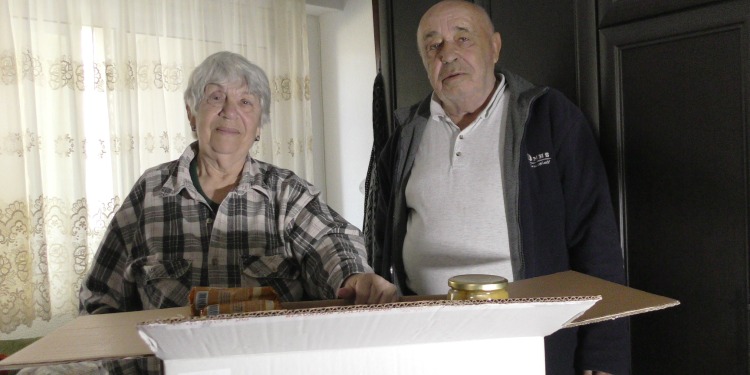Giving Holocaust Survivors Dignity and Fellowship in Their Final Years
The Fellowship | May 3, 2016

Currently there are an estimated 189,000 Holocaust survivors living in Israel. Tragically, 25 percent of them are living below the poverty line, forced to choose between paying for rent or food or medicine, as they can’t afford them all. And many live alone, their loneliness sometimes proving to be the biggest struggle.
When The Fellowship learned about the plight of so many elderly living in poverty in Israel, we launched our With Dignity and Fellowship program. Through a vast team of staff and volunteers, this program helps Israel’s impoverished elderly – many of them Holocaust survivors – with food, medicine, and companionship.
Giving Dignity
Lida and Nikolai live in a small public-housing apartment in Israel, trying to eke out a living on a small social security pension. It’s only because of our With Dignity and Fellowship program that they receive food packages on a monthly basis, providing them with the food they need to survive. We also provide them with volunteers who visit and help alleviate their loneliness.
The two rely on The Fellowship and feel very blessed by the volunteers who take care of their needs – but the volunteers feel equally blessed to be able to bring relief to a couple who have endured so much suffering throughout their lives.
Lida recalls her experience during the Holocaust: “I was 5 years old in 1941 when the war broke out in Russia. I was living in the city of Vyksa. I remember the Nazi warplanes flying back and forth overhead. They bombed everything. I remember the fires, and I remember the smell.”
When the Nazis arrived, her grandparents hoped they wouldn’t hurt the elderly or children. But when her aunt was murdered by the Nazis, they realized they must escape because no Jews were safe. They boarded a cargo train leaving Vyksa.
“It was one of the last trains that was able to get out of the city,” said Lida. “I remember that the train had no roof; it was meant for cows, horses, and other animals, not for human beings. The train took my grandmother, grandfather, mother, and me to Kuzbass, Siberia. We were living next to Joseph Stalin’s prison camps.”
She remembers two things most vividly. She remembers starving for the four years they were in Siberia. When they did have something to eat, usually it was potatoes. “Potatoes saved our lives. The other thing I remember is the horses and wagons that would carry the corpses of the prisoners. I remember the smell of the corpses.”
People Who Care
Nikolai remembers that it was his faith in God that kept his hope alive during the war. “My grandmother used to tell me that I’m a child of God and that God will always help me. In 1938, when I was only 4 years old, my father was murdered by Stalin’s secret police. Stalin had set up a prison camp where the wives and children of enemies of the state were interred. Most of the people in those camps ended up dying from malnutrition or disease. I was out of the country with my grandparents when my mother was sent to the camp. I believe it was God who protected me. It’s because of God that I’m alive.”
After the war, both Nikolai and Lida returned to Vyksa. “We met in university,” said Nikolai. “I believe it was destiny that brought us together.”
They both were studying in medical school, and although they had different specialties, the two found they had a lot in common. “I worked as a pulmonologist, diagnosing and treating lung conditions and diseases,” said Lida. “I specialized in the treatment of infectious diseases,” said Nikolai. “We were well respected and established in the former Soviet Union.”
However, after years of successful careers, the couple made aliyah (immigrated to Israel) in 2004 because they wanted to be near their son and grandchildren. But they soon realized they wouldn’t receive a pension from Russia. And the social security they receive from Israel isn’t enough to pay all of their monthly expenses, which is why they feel so blessed by The Fellowship.
For these two elderly Holocaust survivors, the help they receive from The Fellowship lets them know they always have someone to rely on. “We want to thank The Fellowship and the donors from the bottom of our heart. We don’t have the words to explain how important this assistance is to us. The food is so important to us, but beyond that, it makes us so happy. It makes us feel as if people care about us. It makes us feel as if people need us and think about us. We believe you have such big hearts to do this for people you don’t even know. It’s very important to us.”
